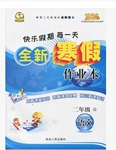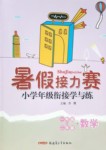题目内容
B. is seen
C. to be seen
D. having been seen

 桃李文化快乐暑假武汉出版社系列答案
桃李文化快乐暑假武汉出版社系列答案 优秀生快乐假期每一天全新寒假作业本系列答案
优秀生快乐假期每一天全新寒假作业本系列答案 暑假接力赛新疆青少年出版社系列答案
暑假接力赛新疆青少年出版社系列答案It was only a few weeks after my surgery. I went to Dr. Belt’s office for a 36 . It was just after my first chemotherapy treatment(化疗). My scar was still very tender.(疼痛的) 37 . I was taken to an examination room to have my blood 38 , again—a terrifying process for me, since I’m so frightened of 39 .
I lay down on the 40 . Then Ramona entered the room. Her 41 smile was familiar, and 42 in contrast to my fears. I’d first seen her in the office a few weeks earlier. She wasn’t my 43 on that day, but I remember her because she was laughing. What could she 44 find to laugh about at a time like this? So I decided she wasn’t 45 enough about the whole thing.
But this day was 46 . Ramona had taken my blood before. She 47 my fear of needles, and she kindly 48 the medical equipment under a magazine. As we opened the layers of bandage, the 49 scar on my chest could be seen.
She gently 50 over and ran her hand across the scar, 51 the smoothness of the healing skin. I began to cry gently and quietly. She brought her warm eyes to mine and said, “You haven’t 52 it yet, have you?” And I said, “No.”
I continued to cry gently. In 53 tones she said. “This is part of your body. This is you. It’s okay to touch it.” But I couldn’t. So she touched it for me. The 54 . The healing wound. And beneath it, she touched my heart.
That night as I lay down, I gently placed my hand on my chest and I left it there 55 I fell asleep. I knew I wasn’t alone.
| 【小题1】 |
|
| 【小题2】 |
|
| 【小题3】 |
|
| 【小题4】 |
|
| 【小题5】 |
|
| 【小题6】 |
|
| 【小题7】 |
|
| 【小题8】 |
|
| 【小题9】 |
|
| 【小题10】 |
|
| 【小题11】 |
|
| 【小题12】 |
|
| 【小题13】 |
|
| 【小题14】 |
|
| 【小题15】 |
|
| 【小题16】 |
|
| 【小题17】 |
|
| 【小题18】 |
|
| 【小题19】 |
|
| 【小题20】 |
|
Scotland is a well-developed tourist destination, with tourism generally being responsible for sustaining 200, 000 jobs mainly in the service sector, with tourist spending averaging at £4 bn per year. Tourists from the United Kingdom make up the bulk (主体) of visitors to Scotland. In 2002, for example, UK visitors made 18.5 million visits to Scotland, staying 64.5 million nights and spending £3.7 bn. In contrast, overseas residents made 1.58 million visits to Scotland, staying 15 million nights and spending £806 m. In terms of overseas visitors, those from the United States made up 24% of visits to Scotland, with the United States being the largest source of overseas visitors, and Germany (9%), France (8%), Canada (7%) and Australia (6%), following behind.
Scotland is generally seen as clean, unspoilt destination with beautiful scenery which has a long and complex history, combined with thousands of historic sites and attractions. These include prehistoric stone circles, standing stones and burial chambers, and various Bronze Age, Iron Age and Stone Age remains. There are also many historic castles, houses, and battlegrounds, ruins and museums. Many people are drawn by the culture of Scotland.
The cities of Edinburgh and Glasgow are increasingly being seen as a cosmopolitan(全世界的)alternative to Scotland’s countryside, with visitors year round, but the main tourist season is generally from April to October inclusive. In addition to these factors, the national tourist agency, VisitScotland, have deployed a strategy of niche (适当的) marketing, aimed at exploiting, amongst other things, Scotland’s strengths in golf, fishing and food and drink tourism. Another significant, and increasingly popular reason for tourism to Scotland — especially by those from North America— is genealogy, with many visitors coming to Scotland to explore their family and ancestral roots.
1.People from ________ visited Scotland most.
|
A.the USA |
B.France |
C.the UK |
D.Germany |
2.For Chinese students, the best time to visit Scotland is in ________.
|
A.the Spring Festival |
B.the winter vocation |
|
C.the summer vacation |
D.any time |
3.Scotland mainly impresses tourists with its ________.
|
A.food and drink |
|
B.beautiful scenery with cultural relics |
|
C.big cities like Edinburgh |
|
D.many North Americans’ family and ancestral roots |
4.In 2002, visitors from the US made about ________ visits to Scotland.
|
A.18.5 m |
B.1.58 m |
C.4.45 m |
D.0.38 m |
5.Which of the following is true according to the text?
|
A.In history, many Scotlanders moved to North America. |
|
B.Overseas visitors do not like to stay in Scotland for the night. |
|
C.VisitScotland is trying to change people’s impression on Scotland. |
|
D.Overseas visitors come to Scotland mainly to explore their family roots. |